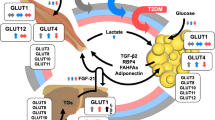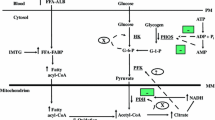Abstract
Controversy exists on whether uncoupling protein 3 (UCP3) positively or negatively influences insulin sensitivity in vivo, and the underlying signaling pathways have been scarcely studied. We studied how a progressive reduction in UCP3 expression (using UCP3 +/+, UCP3 +/−, and UCP3 −/− mice) modulates insulin sensitivity and related metabolic parameters. In order to further validate our observations, we also studied animals in which insulin resistance was induced by administration of a high-fat diet (HFD). In UCP3 +/− and UCP3 −/− mice, gastrocnemius muscle Akt/protein kinase B (Akt/PKB) (serine 473) and AMP-activated protein kinase (AMPK) (threonine 171) phosphorylation, and glucose transporter 4 (GLUT4) membrane levels were reduced compared to UCP3 +/+ mice. The HOMA-IR index (insulin resistance parameter) was increased both in the UCP3 +/− and UCP3 −/− mice. In these mice, insulin administration normalized Akt/PKB phosphorylation between genotypes while AMPK phosphorylation was further reduced, and sarcolemmal GLUT4 levels were induced but did not reach control levels. Furthermore, non-insulin-stimulated muscle fatty acid oxidation and the expression of several involved genes both in muscle and in liver were reduced. HFD administration induced insulin resistance in UCP3 +/+ mice and the aforementioned parameters resulted similar to those of chow-fed UCP3 +/− and UCP3 −/− mice. In conclusion, high-fat-diet-induced insulin resistance in wild-type mice mimics that of chow-fed UCP3 +/− and UCP3 −/− mice showing that progressive reduction of UCP3 levels results in insulin resistance. This is accompanied by decreased fatty acid oxidation and a less intense Akt/PKB and AMPK signaling.




Similar content being viewed by others
References
Vidal-Puig A, Solanes G, Grujic D, Flier JS, Lowell BB (1997) UCP-3, an uncoupling protein homolog expressed preferentially and abundantly in skeletal muscle and brown adipose tissue. Biochem Biophys Res Commun 235:79–82
Lowell BB, Susulic VS, Hamann A, Lawitts JA, Himms-Hagen J, Boyer BB, Kozak LP, Flier JS (1993) Development of obesity in transgenic mice after genetic ablation of brown adipose tissue. Nature 366:740–742
Silvestri E, Moreno M, Lombardi A, Ragni M, de Lange P, Alexson SE, Lanni A, Goglia F (2005) Thyroid hormone effects on putative biochemical pathways involved in UCP3 activation in rat skeletal muscle mitochondria. FEBS Lett 579:1639–1645
Gong DW, He Y, Karas M, Reitman M (1997) Uncoupling protein-3 is a mediator of thermogenesis regulated by thyroid hormone, beta3-adrenergic agonists, and leptin. J Biol Chem 272:24129–24132
Lanni A, Beneduce L, Lombardi A, Moreno M, Boss O, Muzzin P, Giacobino JP, Goglia F (1999) Expression of uncoupling protein-3 and mitochondrial activity in the transition from hypothyroid to hyperthyroid state in rat skeletal muscle. FEBS Lett 444:250–254
De Lange P, Lanni A, Beneduce L, Moreno M, Lombardi A, Silvestri E, Goglia F (2001) Uncoupling protein-3 is a molecular determinant for the regulation of resting metabolic rate by thyroid hormone. Endocrinology 142:3414–3420
Cusin I, Zakrzewska KE, Boss O, Muzzin P, Giacobino JP, Ricquier D, Jeanrenaud B, Rohner-Jeanrenaud F (1998) Chronic central leptin infusion enhances insulin-stimulated glucose metabolism and favors the expression of uncoupling proteins. Diabetes 47:1014–1019
Simonyan RA, Jimenez M, Ceddia RB, Giacobino JP, Muzzin P, Skulachev VP (2001) Cold-induced changes in the energy coupling and the UCP3 level in rodent skeletal muscles. Biochim Biophys Acta 1505:271–279
Cadenas S, Echtay KS, Harper JA, Jekabsons MB, Buckingham JA, Grau E, Abuin A, Chapman H, Clapham JC, Brand MD (2002) The basal proton conductance of skeletal muscle mitochondria from transgenic mice overexpressing or lacking uncoupling protein-3. J Biol Chem 277:2773–2778
De Lange P, Ragni M, Silvestri E, Moreno M, Schiavo L, Lombardi A, Farina P, Feola A, Goglia F, Lanni A (2004) Combined cDNA/RT–PCR analysis of gene expression profile in rat gastrocnemius muscle: relation to its adaptative function in energy metabolism during fasting. FASEB J 18:350–352
De Lange P, Farina P, Moreno M, Ragni M, Lombardi A, Silvestri E, Burrone L, Lanni A, Goglia F (2006) Sequential changes in the signal transduction responses of skeletal muscle following food deprivation. FASEB J 20:2579–2581
Cadenas S, Buckingham JA, Samec S, Seydoux J, Din N, Dulloo AG, Brand MD (1999) UCP2 and UCP3 rise in starved rat skeletal muscle but mitochondrial proton conductance is unchanged. FEBS Lett 462:257–260
Hesselink MK, Greenha PL, Constantin-Teodosiu D, Hultman E, Saris WH, Nieuwlaat R, Schaart G, Kornips E, Schrauwen P (2003) Increased uncoupling protein-3 content does not affect mitochondrial function in human skeletal muscle in vivo. J Clin Invest 111:479–486
Goglia F, Skulachev VP (2003) A function for novel uncoupling proteins: antioxidant defense of mitochondrial matrix by translocating fatty acid peroxides from the inner to the outer membrane leaflet. FASEB J 17:1585–1591
Lombardi A, Busiello RA, Napolitano L, Cioffi F, Moreno M, de Lange P, Silvestri E, Lanni A, Goglia F (2010) Uncoupling protein-3 (UCP3) translocates lipid hydroperoxide and mediates lipid hydroperoxide-dependent mitochondrial uncoupling. J Biol Chem 285:16599–16605
Seifert EL, Bezaire V, Estay C, Harper ME (2008) Essential role for uncoupling protein-3 in mitochondrial adaptation to fasting but not in fatty acid oxidation or fatty acid anion export. J Biol Chem 283:25134–25131
Bezaire V, Seifert EL, Harper ME (2007) Uncoupling protein-3: clues in an ongoing mitochondrial mystery. FASEB J 21:312–324
Samec S, Seydoux J, Dulloo AG (1998) Role of UCP homologues in skeletal muscles and brown adipose tissue: mediators of thermogenesis or regulators of lipids as fuel substrate? FASEB J 12:715–724
Samec S, Seydoux J, Dulloo AG (2000) Downregulation of skeletal muscle UCP-3 gene expression during refeeding is prevented by cold exposure. Pflugers Arch 439:723–729
De Lange P, Moreno M, Silvestri E, Lombardi A, Goglia F, Lanni A (2007) Fuel economy in food-deprived skeletal muscle: signalling pathways and regulatory mechanisms [review]. FASEB J 21:3431–3441
Choi CS, Fillmore JJ, Kim JK, Liu ZK, Kim S, Collier EF, Kulkarni A, Distefano A, Hwang YJ, Kahn M, Chen Y, Yu C, Moore IK, Reznick RM, Higashimori T, Shulman GI (2007) Overexpression of uncoupling protein 3 in skeletal muscle protects against fat-induced insulin resistance. J Clin Invest 117:1995–2003
Clapham JC, Arch JR, Chapman H, Haynes A, Lister C, Moore GB, Piercy V, Carter SA, Lehner I, Smith SA, Beeley LJ, Godden RJ, Herrity N, Skehel M, Changani KK, Hockings PD, Reid DG, Squires SM, Hatcher J, Trail B, Latcham J, Rastan S, Harper AJ, Cadenas S, Buckingham JA, Brand MD, Abuin A (2000) Mice overexpressing human uncoupling protein-3 in skeletal muscle are hyperphagic and lean. Nature 406:415–418
Huppertz C, Fischer BM, Kim YB, Kotani K, Vidal-Puig A, Slieker LJ, Sloop KW, Lowell BB, Kahn BB (2001) Uncoupling protein 3 (UCP3) stimulates glucose uptake in muscle cells through a phosphoinositide 3-kinase-dependent mechanism. J Biol Chem 276:12520–12529
Costford SR, Chaudhry SN, Salkhordeh M, Harper ME (2006) Effects of the presence, absence, and overexpression of uncoupling protein-3 on adiposity and fuel metabolism in congenic mice. Am J Physiol Endocrinol Metab 290:E1304–E1312
Costford SR, Chaudry SN, Crawford SA, Salkhordeh M, Harper ME (2008) Long-term high-fat feeding induces greater fat storage in mice lacking UCP3. Am J Physiol Endocrinol Metab 295:E1018–E1021
Schrauwen P, Hesselink MKC, Blaak EE, Borghouts LB, Schaart G, Saris WHM, Keizer HA (2001) Uncoupling protein 3 content is decreased in skeletal muscle of patients with type 2 diabetes. Diabetes 50:2870–2873
Adams SH, Hoppel CL, Lok KH, Zhao L, Wong SW, Minkler PE, Hwang DH, Newman JW, Garvey WT (2009) Plasma acylcarnitine profiles suggest incomplete long-chain fatty acid (beta) oxidation and altered tricarboxylic acid cycle activity in type 2 diabetic African-American women. J Nutr 139:1073–1081
Jia J-J, Zhang X, Ge CR, Jois M (2009) The polymorphisms of UCP2 and UCP3 genes associated with fat metabolism, obesity and diabetes. Obes Rev 10:519–526
Gong DW, Monemdjou S, Gavrilova O, Leon LR, Marcus-Samuels B, Chou CJ, Everett C, Kozak LP, Li C, Deng C, Harper ME, Reitman ML (2000) Lack of obesity and normal response to fasting and thyroid hormone in mice lacking uncoupling protein-3. J Biol Chem 275:16251–16257
Tiraby C, Tavernier G, Capel F, Mairal A, Crampes F, Rami J, Pujol C, Boutin LD (2007) Resistance to high-fat-diet-induced obesity and sexual dimorphism in the metabolic responses of transgenic mice with moderate uncoupling protein 3 overexpression in glycolytic skeletal muscles. Diabetologia 50:2190–2199
Kerner J, Turkaly PJ, Minkler PE, Hoppel CL (2001) Aging skeletal muscle mitochondria in the rat: decreased uncoupling protein-3 content. Am J Physiol Metab 281:E1054–E1062
Alexson SEH, Nedergaard J (1988) A novel type of short- and medium-chain acyl-CoA hydrolases in brown adipose tissue mitochondria. J Biol Chem 263:13564–13571
Vidal-Puig AJ, Grujic D, Zhang CY, Hagen T, Boss O, Ido Y, Szczepanik A, Wade J, Mootha V, Cortright R, Muoio DM, Lowell BB (2000) Energy metabolism in uncoupling protein 3 gene knockout mice. J Biol Chem 275:16258–16266
Camps M, Castello A, Munoz P, Monfar M, Testar X, Palacin M, Zorzano A (1992) Effect of diabetes and fasting on GLUT-4 (muscle/fat) glucose transporter expression in insulin-sensitive tissues. Biochem J 282:765–772
Kiens B (2006) Skeletal muscle lipid metabolism in exercise and insulin resistance. Physiol Rev 86:205–243
De Lange P, Senese R, Cioffi F, Moreno M, Lombardi A, Silvestri E, Goglia F, Lanni A (2008) Rapid activation by 3, 5, 3′-L-triiodothyronine of AMPK/ACC and Akt/PKB signaling pathways: relation to changes in fuel metabolism and myosin heavy chain protein content in rat gastrocnemius muscle in vivo. Endocrinology 149:6462–6470
Criscuolo F, Mozo J, Hurtaud C, Nubel T, Bouillaud F (2006) UCP2, UCP3, avUCP, what do they do when proton transport is not stimulated? Possible relevance to pyruvate and glutamine metabolism. Biochim Biophys Acta 175:1284–1291
Isumiya Y, Hopkins T, Morris C, Sato K, Zeng L, Viereck J, Hamilton J, Ouchi N, LeBrasseur NK, Walsh K (2008) Fast/glycolytic muscle fiber growth reduces fat mass and improves metabolic parameters in obese mice. Cell Metab 7:159–172
Sanderson LM, Boekschoten MV, Desvergne B, Muller M, Kersten S (2009) Transcriptional profiling reveals divergent roles of PPAR alpha and PPAR beta/delta in regulation of gene expression in mouse liver. Physiol Genomics 41:42–52
Acknowledgment
This study was supported by a Grant from Ministero dell’Istruzione dell’Università, e della Ricerca COFIN—Protocol Number 20089SRS2X.
Ethical standards
The experiments comply with the current Italian laws.
Conflict of interest
The authors declare that they have no conflict of interest.
Author information
Authors and Affiliations
Corresponding authors
Additional information
Rosalba Senese and Vivien Valli contributed equally to the work.
Rights and permissions
About this article
Cite this article
Senese, R., Valli, V., Moreno, M. et al. Uncoupling protein 3 expression levels influence insulin sensitivity, fatty acid oxidation, and related signaling pathways. Pflugers Arch - Eur J Physiol 461, 153–164 (2011). https://doi.org/10.1007/s00424-010-0892-3
Received:
Revised:
Accepted:
Published:
Issue Date:
DOI: https://doi.org/10.1007/s00424-010-0892-3




